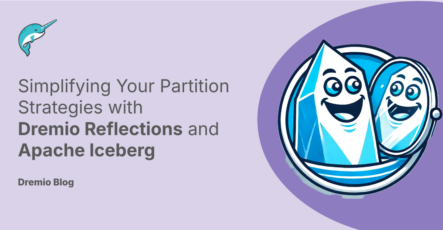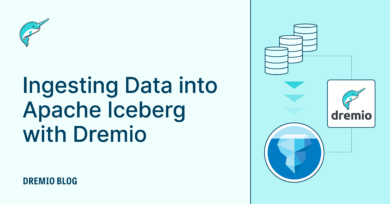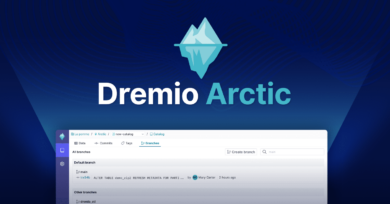6 minute read · October 3, 2024
Simplifying Your Partition Strategies with Dremio Reflections and Apache Iceberg
· Senior Tech Evangelist, Dremio

Designing an optimal partitioning strategy for your data is often one of the most challenging aspects of building a scalable data platform. In traditional systems, data engineers frequently partition data by multiple columns, such as date and another frequently queried field. However, this can result in too many small files or partitions, which ultimately leads to performance degradation. Fortunately, using Dremio in conjunction with Apache Iceberg offers a more streamlined approach to partitioning.
With Dremio’s powerful Reflections feature, you can simplify partitioning by focusing primarily on date partitioning for the raw table, while using reflections to optimize for specific query patterns. This makes designing and managing partition strategies much simpler and more efficient.
Optimizing Queries Without Over-Partitioning
Let's consider a scenario where you have a dataset partitioned by month. Your queries might frequently filter on colA or colB. Traditionally, you might try to partition the dataset by date, colA, and colB. While this ensures that the queries on colA or colB are optimized, it also creates numerous small partitions. These fragmented partitions can hurt overall performance, especially for queries that don't align with these partitions.
Instead, with Dremio and Iceberg, you can partition your raw table by date and create two separate reflections—one optimized for queries on colA, and another for queries on colB. Dremio’s query planner automatically substitutes the appropriate reflection depending on the query, providing performance benefits without the complexity of multi-column partitioning. This eliminates the need to create intricate partitioning strategies that could result in an overwhelming number of small files.
The Power of Reflections with Apache Iceberg
Reflections become even more powerful when the source data is stored in Apache Iceberg. Dremio’s Incremental Reflections and Live Reflections features significantly enhance the efficiency and freshness of your data.
- Live Reflections automatically trigger a refresh whenever the underlying Iceberg table is updated.
- Incremental Reflections ensure that only the changed data is processed during refreshes, which keeps the reflection refresh process lightweight and minimizes compute costs. This means you can maintain the maximum freshness of your data with minimal performance impact.
By using Dremio's reflections on an Iceberg table, you avoid over-partitioning your raw data, keeping it flexible for queries that fall outside typical patterns. Maintenance is also simplified, as date-partitioned tables are easier to manage. For example, if your table is partitioned by day, you can run compaction at the end of each day, targeting only that day's partition, improving storage and query performance.
Best Practices for Reflection and Partition Optimization
In addition to partitioning strategies, it's important to consider best practices for managing reflections, especially when working with joins between multiple tables. Here's a common scenario:
Suppose you need to create a reflection on a join between Table A, Table B, and Table C, where Table A and Table B are Iceberg tables, but Table C is not. In this case, it's often best to:
- First, join Table A and Table B.
- Create a reflection on this join, optimizing for this specific operation.
- Then, join this reflected view with Table C and create a separate reflection for this final result.
This approach ensures that the expensive join between Table A and Table B is processed only once and benefits from live and incremental refreshes, rather than being fully recomputed each time you refresh the reflection on the final dataset involving Table C. By strategically using reflections, you can keep query acceleration efficient, minimizing both compute costs and query times.
Conclusion
With Dremio and Apache Iceberg, managing partitioning and optimizing queries becomes far simpler and more effective. By leveraging Reflections, Incremental Reflections, and Live Reflections, you can maintain fresh data, reduce the complexity of partitioning strategies, and optimize for different query plans without sacrificing performance. Using Dremio’s flexible approach, you can balance keeping raw tables simple and ensuring that frequently run queries are fully optimized.
Strategic use of reflections can accelerate queries, reduce costs, and ultimately simplify the management of your data platform—keeping it both powerful and easy to maintain.
Sign up for AI Ready Data content


